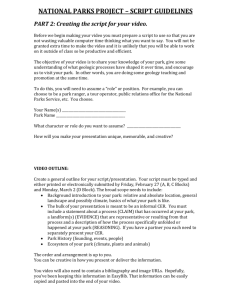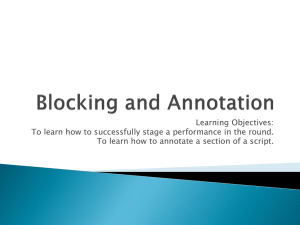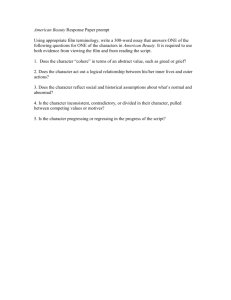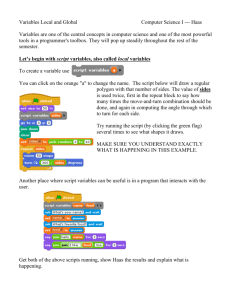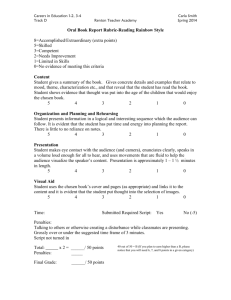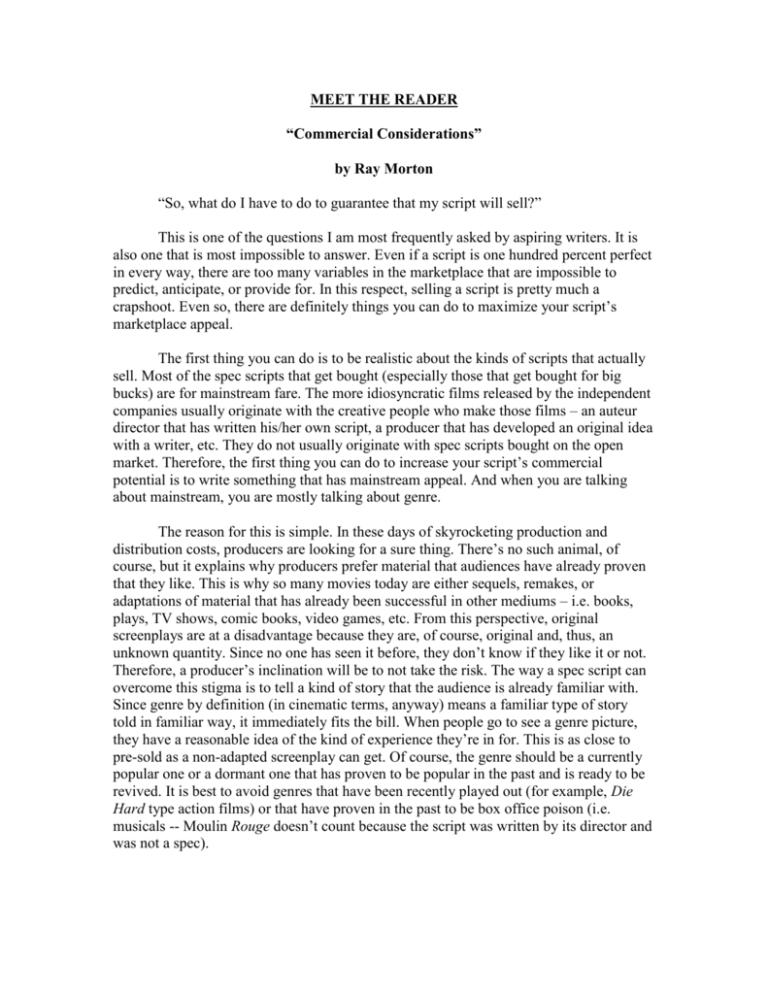
MEET THE READER
“Commercial Considerations”
by Ray Morton
“So, what do I have to do to guarantee that my script will sell?”
This is one of the questions I am most frequently asked by aspiring writers. It is
also one that is most impossible to answer. Even if a script is one hundred percent perfect
in every way, there are too many variables in the marketplace that are impossible to
predict, anticipate, or provide for. In this respect, selling a script is pretty much a
crapshoot. Even so, there are definitely things you can do to maximize your script’s
marketplace appeal.
The first thing you can do is to be realistic about the kinds of scripts that actually
sell. Most of the spec scripts that get bought (especially those that get bought for big
bucks) are for mainstream fare. The more idiosyncratic films released by the independent
companies usually originate with the creative people who make those films – an auteur
director that has written his/her own script, a producer that has developed an original idea
with a writer, etc. They do not usually originate with spec scripts bought on the open
market. Therefore, the first thing you can do to increase your script’s commercial
potential is to write something that has mainstream appeal. And when you are talking
about mainstream, you are mostly talking about genre.
The reason for this is simple. In these days of skyrocketing production and
distribution costs, producers are looking for a sure thing. There’s no such animal, of
course, but it explains why producers prefer material that audiences have already proven
that they like. This is why so many movies today are either sequels, remakes, or
adaptations of material that has already been successful in other mediums – i.e. books,
plays, TV shows, comic books, video games, etc. From this perspective, original
screenplays are at a disadvantage because they are, of course, original and, thus, an
unknown quantity. Since no one has seen it before, they don’t know if they like it or not.
Therefore, a producer’s inclination will be to not take the risk. The way a spec script can
overcome this stigma is to tell a kind of story that the audience is already familiar with.
Since genre by definition (in cinematic terms, anyway) means a familiar type of story
told in familiar way, it immediately fits the bill. When people go to see a genre picture,
they have a reasonable idea of the kind of experience they’re in for. This is as close to
pre-sold as a non-adapted screenplay can get. Of course, the genre should be a currently
popular one or a dormant one that has proven to be popular in the past and is ready to be
revived. It is best to avoid genres that have been recently played out (for example, Die
Hard type action films) or that have proven in the past to be box office poison (i.e.
musicals -- Moulin Rouge doesn’t count because the script was written by its director and
was not a spec).
Mixed genres (comedy dramas, dramatic comedies, horror musicals, etc) are a
dicey proposition. The whole appeal of a genre piece is that the audience knows what to
expect. If you mix genres, you’re once again presenting material that is unfamiliar, that
confounds expectations, and runs the risk of either confusing or disappointing. This can
cause risk-averse producers to shy away. If you’re going to mix genres in your writing,
make sure you are really clear about what you are doing and that you honor the
conventions of all of the genres that you are interpolating.
The next thing you can do is to fine-tune the various individual elements of your
script to give them as much commercial appeal as possible.
1. PREMISE
To begin with, you should have one (don’t laugh – I can’t begin to tell you how
many scripts I read that don’t). Producers buy stories; they don’t buy character studies,
mood pieces, interior meditations, or tone poems. If you want to sell a script, you need to
have a solid idea for a solid story. Next, your premise needs to have a very strong “hook”
– a jumping off point for a story that can grab an audience and pull them in (hence the
term “hook”). For example: a man gets bitten by a radioactive arachnid and gains the
powers of a spider; a kid learns he can see dead people; an alien gets stranded on earth. If
you don’t have a strong hook, then you should at least have some sort of very exploitable
element – i.e. sex, violence, or controversy -- that will give your script an “edge” that can
be used to sell the story to the public. Finally, make sure your premise is very, very clear.
If you ask someone to buy your script, the first thing they’re going to want to know is
what it is about. Don’t make them work too hard to figure it out or else they’ll lose
interest and move on to the next script in the pile.
2. PLOT
First of all, your plot should fulfill genre expectations. All stories in a specific
genre have certain conventions or elements that are specific to that genre. (For example,
in a Romantic Comedy, you need to have two people from different worlds “meet cute,”
develop an instant mutual dislike, gradually warm to one another and eventually fall in
love. A problem -- usually stemming from the differences between their two worlds –
needs to arise between them, causing them to break up. Eventually, they need to realize
how much they love each other and find a way to bridge the gap between them.) If your
story doesn’t have those elements, then it doesn’t belong to that genre. Make sure that
you work these elements into your script in some way (either by employing them
directly, twisting them, or finding some clever way of subverting them). If you do, then
the potential buyer will feel assured that the film will meet the audience’s expectations.
Next, your plot should have four or five solid set pieces that are appropriate for the genre
you are working in (for example, an action movie needs to have some really good car
chases, explosions, and duels-to-the death; a slapstick comedy should have a bunch of
side-splitting pratfalls, elaborate farce sequences, and at least one good pie-in-the-face).
The story should be well paced – slow and boring gets you nowhere – and it should have
a reasonably happy or hopeful ending. Writers and directors love downbeat endings, but
producers don’t because they think audiences don’t (and they’re usually right). The
purists out there among us may cringe, but the truth is that if you end your script on a
down note, you’re going to have a lot harder time making a sale. Finally, like the
premise, the plot should be clear. Complex is great, complicated isn’t. Any storytelling
gimmicks (time shifting, narration, flashbacks, etc) should be germane to both the theme
and the concept and should enhance the plot, not confuse it. If buyers have to spend too
much time figuring out what’s going on, they may opt to take their checkbooks and move
on.
3. CHARACTERS
Whether your characters are one-note caricatures or fully fleshed out, threedimensional human beings, they have to be interesting. There has to be something about
them – a peculiar quirk or character trait, a trademark piece of behavior, a colorful
backstory, etc. – that grabs our attention and fascinates us. They don’t have to be
likeable, but they should be sympathetic or at least understandable. They need to be
people we want to spend time with. Most importantly, your lead characters need to be
castable. These days, the single most important factor in getting a movie off the ground is
the participation of a star actor. That means you have to write parts that can be played by
actors that are currently considered hot. The trick, of course, is that you can’t make the
character so specific that it can only be played by one actor, because if that actor isn’t
available, then your script will be unproduceable and no one will want to buy it. You
have to write characters specific enough to match the pool, but generic enough so that
producers can cast it in different ways (this doesn’t mean, by the way, that you’re going
to get a star to be in your movie, you just need to make a producer think he can). Finally,
your characters should be clear – we should know who they are and what they’re about
without too much guessing. Ambiguity is okay for red-herrings, but not for protagonists.
4. DIALOGUE
The dialogue should be sharp, clever, and witty. It should sound lifelike and it
should be brief. (Do not have characters give speeches that go on for pages and pages.
Nobody in real life talks like that and all it does is bore the heck out of people). Don’t let
it get bogged down in exposition. Finally, your dialogue should be clear – we should
never have to guess what your characters are talking about.
5. WRITING
The writing should be crisp and brisk. It should tell your story with energy and
pacing. Don’t get bogged down in extraneous detail or you’re going to bore your reader.
(You’re a writer – nobody needs you to describe every little detail of the sets, lighting or
camera movement. That’s what directors, cinematographers, and production designers are
for. ) It should have wit and style (but try to avoid the stream of conscious smart-assing
favored by so many aspiring writers these days – it’s annoying and tiresome and can turn
your buyer off). It should be cinematic and visual. Above all, it should be clear (are you
sensing a theme here?). We should always have a really good idea of what’s going on and
why.
Of course, simply addressing these considerations aren’t enough. You still need to
have all of the other components of a good script – a fresh story, well-rounded characters,
great dialogue, and cinematic writing. Even the most commercial script in the world
won’t sell if it isn’t any good.
THE END
Copyright © 2005 Ray Morton. All Rights Reserved.

